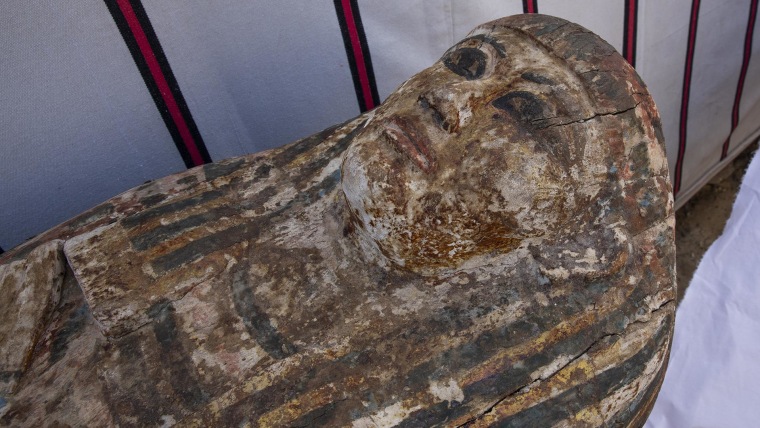CAIRO — Some are blaming the "curse of the pharaohs" for a string of unfortunate incidents in Egypt in recent weeks, including the giant ship that blocked the Suez Canal for about a week until it was freed Monday.
But many were nonetheless expected to turn on their TVs for the grand parade of 22 ancient Egyptian royal mummies as they were transferred across the capital, Cairo, on Saturday. Officials urged people to stay off the streets because of coronavirus restrictions.
Authorities shut down roads along the Nile for the elaborate royal procession dubbed the Golden Parade, designed to drum up interest in the north African country's rich collections of antiquities when tourism has almost entirely stalled because of the coronavirus pandemic.
The convoy transported 18 kings and four queens, mostly from the New Kingdom ancient era, in shock-absorber vehicles and specially designed capsules filled with nitrogen to ensure they are protected.
The national treasures traveled about 3 miles from the Egyptian Museum, opened in 1902 in central Cairo's Tahrir Square, to their new home in the National Museum of Egyptian Civilization in Fustat — the site of Egypt's capital under the Umayyad dynasty after the Arab conquest.
Moving the mummies has reignited talk of a pharaoh's curse, particularly on social media, after the ship blocked the Suez Canal, a train crash killed dozens late last month and a building collapsed in central Cairo.
"Death will come on quick wings for those who disturb the king's peace," the warning on the tomb of Tutankhamun read, before British archaeologist Howard Carter opened it in 1922.
Members in his expedition later succumbed to freak accidents and death, fueling the myth of the curse, although archaeologists and scientists now say they were likely linked to being exposed to dust and germs in the sealed caverns.
Egyptian archaeologist Zahi Hawass dismissed the rumors.
"Before the mummies will be walking today in the streets of Cairo things happened in Egypt: the boat in the Suez Canal, also the trains had an accident and a building collapsed. Everyone says this is the curse of the mummy, but I say there is no curse of the mummy," he told NBC News. "The curse is good for TV, for movies and newspapers, but it's not true. There's no curse at all."
Instead, Hawass said locals and foreign tourists will be able to see for themselves the "secrets" held by each mummy once they're on display.
"The parade is very important not only for Egypt but for the whole world because 22 kings will walk in the streets of Cairo as magic," he added.
Download the NBC News app for breaking news and politics
Archaeologists discovered the mummies in two batches in 1881 and 1898 at the complex of mortuary temples of Deir Al Bahari in Luxor and at the nearby Valley of the Kings.
The oldest mummy in the group is that of King Seqenenre Tao, the last king of the 17th Dynasty, who reigned in 16th century B.C. and is thought to have met a violent death.
The parade will also include the mummies of Ramses II, Seti I and Queen Ahmose-Nefertari, who were responsible for military expeditions, trade networks and the building of vast monuments and artistic creations.
"By doing it like this, with great pomp and circumstance, the mummies are getting their due," Salima Ikram, an Egyptologist at American University in Cairo, told Reuters. "These are the kings of Egypt, these are the pharaohs. And so, it is a way of showing respect."
Charlene Gubash reported from Cairo and Adela Suliman from London.
Raf Sanchez and Reuters contributed.
World - Latest - Google News
April 03, 2021 at 09:44PM
https://ift.tt/2R42n9j
Myth of 'pharaoh's curse' dismissed as Egypt parades ancient mummies - NBC News
World - Latest - Google News
https://ift.tt/2SeTG7d
Bagikan Berita Ini

















0 Response to "Myth of 'pharaoh's curse' dismissed as Egypt parades ancient mummies - NBC News"
Post a Comment